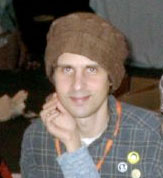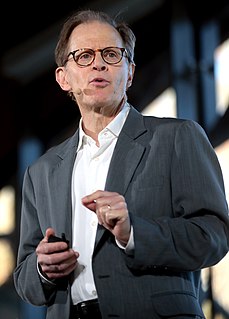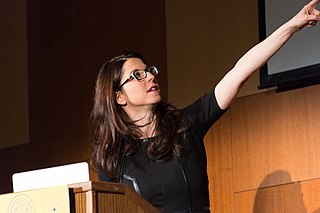A Quote by John Porcellino
Through my life and my experience, I believe getting "positive mental attitude" is true. Your brain has certain pathways in it, and if you feed those pathways with certain types of thoughts, the blood goes to those neurons and nourishes them, and they grow and develop. That's how you build habits. Physically, I think that's how your brain works. If you have certain habits that are negative and causing you problems that you want to change them, you can actually change the blood flow and stuff in your brain by thinking a different way.
Quote Topics
Actually
Attitude
Believe
Blood
Blood Flow
Brain
Build
Causing
Certain
Change
Develop
Different
Different Way
Experience
Feed
Flow
Getting
Goes
Grow
Habits
How
I Believe
Life
Mental
Mental Attitude
My Life
Negative
Neurons
Pathways
Physically
Positive
Positive Mental Attitude
Problems
Stuff
Them
Think
Thinking
Those
Thoughts
Through
True
Types
Want
Way
Works
Your
Related Quotes
Neural science, which is the study of the brain, tells us that we have up to one billion brain cells with thousands of branches that communicate with each other much like a complex highway system. The more we attend to something, or the more we engage in certain behaviors, the more those particular cells communicate and the pathways between them deepen. This is how our values, our beliefs, and our motivations are actually formed.
The everyday brain could be dubbed "the baseline brain," because it operates at the minimum functioning to keep you alive and healthy. It controls your heart rate, your blood pressure, your immune function, all of your subconscious impulses. That's not a minor role; the baseline brain is a marvel of complexity and efficiency. But too much of it is devoted to habits, old conditioning, unconscious reflexes, and lack of self-awareness.
That's what I like about the idea of the aesthetic experience, the idea of both enjoying looking at works of art and how they kind of talk to you, and also the process of making art, getting back to that idea of the aesthetic experience of making art is very important, It's another way of thinking. Instead of just using your brain, you're using your hands to think with. They're different connections, the brain that comes through the fingertips as opposed that comes through the eyes and ears.
I've found is that by doing stand-up, I've actually learned how to combat depression. I don't have clinical, but I've definitely had my bouts with it. I just figured out that it's a choice. You're in control of your brain. When your brain is sending you bad information or bad thoughts, you can decide to go to the gym, or write a new joke - or if you're on the road, go to a ball game... something that's going to get the blood going. Or you can let those thoughts take you right down the rabbit hole.
A fixed habit is supported by old, well-worn pathways in the brain. When you make conscious choices to change a habit, you create new pathways. At the same time, you strengthen the decision-making function of the cerebral cortex while diminishing the grip of the lower, instinctual brain. So without judging your habit, whether it feels like a good one or a bad one, take time to break the routine, automatic response that habit imposes.
The brain is the most complicated organ in the universe. We have learned a lot about other human organs. We know how the heart pumps and how the kidney does what it does. To a certain degree, we have read the letters of the human genome. But the brain has 100 billion neurons. Each one of those has about 10,000 connections.
Have things to look forward to: Plan a trip, treat yourself to the spa, make plans in the future so that you can focus on what you're looking forward to versus how unbearable your present is. Understand that your brain is detaching. It's the same part of the brain that is activated as a cocaine user feening for their next fix. You're literally in withdrawal. Understand that it takes time for your brain and neural pathways to detach. You're not going crazy - it's just a process, and that process takes time.
We now know that the way to help a child develop optimally is to help create connections in her brain—her whole brain—that develop skills that lead to better relationships, better mental health, and more meaningful lives. You could call it brain sculpting, or brain nourishing, or brain building. Whatever phrase you prefer, the point is crucial, and thrilling: as a result of the words we use and the actions we take, children’s brains will actually change, and be built, as they undergo new experiences.

































